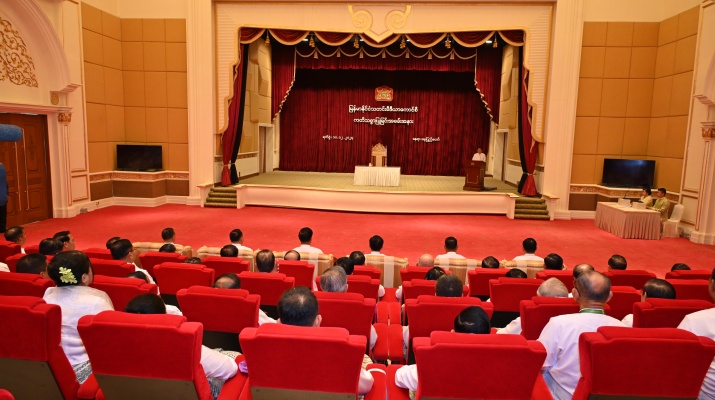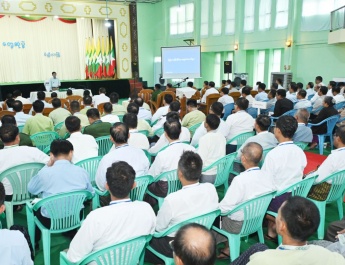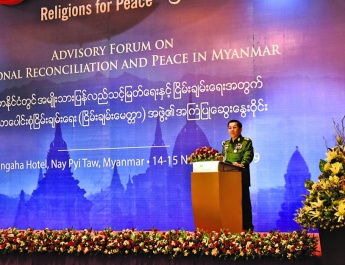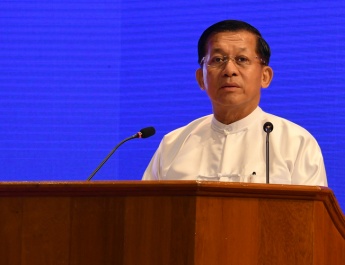NAY PYI TAW December 10
Affirmation ceremony of the members of Myanmar Press Council was held at Thabin Hall of State Administration Council Chairman’s Office, here this afternoon, address by Chairman of State Administration Council Prime Minister Senior General Min Aung Hlaing Also present were SAC Secretary General Aung Lin Dway, SAC Joint Secretary General Ye Win Oo, SAC members, union level officials, union ministers, the Nay Pyi Taw Council chair, deputy ministers, officials, Chair of MPC Dr Tin Tun Oo, vice chairs, members, the secretary and the joint secretary.
First, the chair of MPC, vice chairs, members, the secretary and the joint secretary took the oath in the presence of the Senior General.
In his address, the Senior General said in all seriousness, the media sector is regarded as the State’s fourth estate. So, serious attention is paid to the media sector and enthusiastic efforts are being made for the progress of the media world.
The country is on the way towards correctly exercising democracy and building a Union based on democracy and federalism. A democratic society can exercise the freedom of expression in accord with the law. So also, good governance and progress are essential.
There must be a balance and harmony between all those needs.
The State Constitution states that every citizen has the right to freely express or publish their beliefs and opinions, if they are not against the security of the State, the rule of law, community peace or against the laws enacted for the sake of people’s ethics.
Hence, freedom has limits.
The expression should not be against the existing laws and should not be a slander against the freedom and rights of a person, organization, or the State. There is the freedom and rights on one side and the responsibility, obligation and morals on the other side and there must be a balance between the two.
The media sector plays a vital role in striking a balance between the two. It is common knowledge that politically and economically powerful groups are using and raising the media as their tool to interfere in and manipulate the developing countries that are in their initial stage of democracy transition.
They are exporting news reports according to their wish through such media, while ignoring the attitudes, aspirations and grievances of the people. The worst is that the powers are even applying various kinds of plots and means to cause instability, escalate conflicts and commotions in the developing countries till they collapse.
Especially, common knowledge of democracy among the people is “Acceptance of diversity.” Media persons must exercise the culture of understanding and accepting different opinions, thoughts and professions and recognizing with respect their mutual co-existence.
The country has passed through various systems throughout the years after it regained independence, and various kinds of pressures have created gaps in intellectual knowledge, education and technical knowledge among the people. Tatmadaw is shouldering multiple duties of the State at present due to the national requirement. Unethical media under alien influence are indoctrinating the people, who have passed through different eras, with fake news, misinformation, hate speech in pushing them towards accepting wrong opinions and ideas.
I acknowledge that journalists, as human beings, naturally have individual preferences and subjective perspectives. However, I strongly urge them to approach their work with impartiality, setting aside personal interests and opinions, particularly when reporting on national and public affairs.
Furthermore, I would like to inform you that holding onto prejudice and failing to approach matters objectively, focusing solely on personal beliefs, ignoring differing viewpoints, and promoting hate speech may lead to being perceived as a journalist lacking integrity.
If we examine the primary duties of the Council as outlined in the Press and Media Law, they include enhancing the quality of the press through monitoring, coordinating with relevant departments to facilitate the import of press and media equipment, organizing workshops and seminars, collaborating with press organizations to present awards to outstanding journalists, and developing and implementing plans to advance the press and media industry.
I am pleased and proud to see that the previous Council made great efforts to fulfill these responsibilities. I am confident that the current Council will also successfully carry out these duties. I urge them to continue their work with success. Additionally, I would like to announce that we have begun the construction of a large “Sarso Beikman” building to honor distinguished literary scholars. This building will proudly showcase their literary works, biographies, and artistic creations, as well as facilitate activities aimed at the development of literature.
If we consider the term “journalist,” then our national leader, General Aung San, must also be recognized as a journalist.
Through his role as editor of Oway Magazine, he was able to inspire the national spirit across the country in opposition to British colonialism. Similarly, during and after the country’s struggle for independence, many distinguished literary scholars used their work to promote nationalism and union spirit, helping to preserve and strengthen the nation’s sovereignty. Therefore, I would like to express my deepest respect and honor to all the great journalists who have served our nation throughout history.
We observe that Myanmar Writers’ Association and Myanmar Motion Picture Organisation periodically provide support to senior literary scholars and artists. Similarly, I urge you to explore ways to offer necessary support to retired journalists across Myanmar and ensure that their experience, knowledge, and insights are passed on to both the state and the new generation of journalists.
It is said that journalism is like a river, flowing with many branches. The artistic creations rooted in literature, human life, socio-economic development, societal organization, and the history of politics, economics, and culture are intertwined, spreading out like the branches of a river.
Therefore, every journalist or media professional must contribute positively to the world and bring benefits to society. They should reflect the social lives of all communities impartially and preserve the cultural characteristics of their people and country to ensure they are not lost.
The scope of media work is so vast that it cannot be defined in a specific way. However, it must be guided by the wisdom and reasoning of those involved in the media.
Our country is a developing nation that has recently transitioned to democracy. Some powerful countries are attempting to influence our nation by criticizing our human rights and democratic standards. However, we are not solely focused on democratic standards that may not align with our country. Instead, we are confidently moving forward toward our goals, guided by the country’s actual situation, socio-economic development, the lessons learned from our historical experiences, and the provisions of the Constitution.
In this context, the news media, as the fourth estate of the country, must report and broadcast both truth and falsehood, good and evil, impartially and fairly. It should operate without restraint, free from being manipulated by any individual or organization. The media must uphold ethical standards, prioritize the interests of the country and its people, and contribute to the media landscape in a free, independent, and impartial manner. Furthermore, I urge everyone to oppose and prevent the spread of propaganda that is fueling unrest and instability in the country.
Then, the Senior General along with the members of the SAC, posed for a group photo with the members of the Myanmar Press Council.
Later, it was reported that the Senior General warmly greeted the members of the Council and hosted a tea reception for them.





